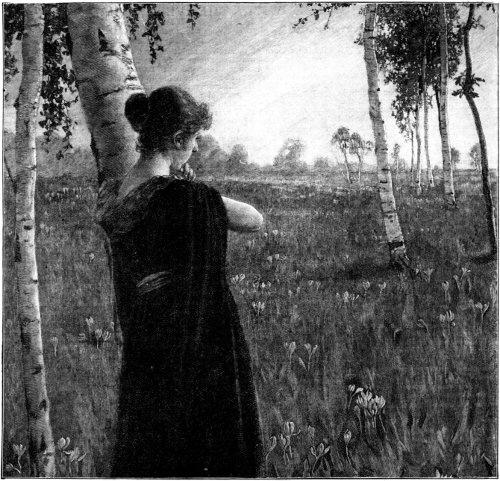As the season turns from summer to autumn in 2021, I decided to re-publish a distinctly autumnal poem from a similar time in 1899. The poem is William Thomas Saward’s Solitude, which was published in the September 23, 1899 issue of The Girl’s Own Paper. In this article, I will reprint the poem with the original photo that accompanied it in The Girl’s Own Paper before offering a little bit of information about the poet behind it.
“Solitude” by William Thomas Saward


THE wind is singing a lovely song,
Down in the forest deep!
And I watch and watch the whole day long,
Till the evening shadows creep.
O flowers of the dying autumn day,
How can you bloom when my love's away!
The golden grain of the harvest falls
Under the sickle's breath;
And along the wood a spirit calls,
Telling there is no death!
For be it autumn, or be it spring,
Some flowers will bloom, and some birds will sing!
The night falls dark o'er the Fatherland,
Down to the stretching sea!
O Star of Hope! with your silver wand,
Guide him to home and me!
That the morning may find us hand in hand
In the light of the well-loved fatherland
Brief Seasonal Thoughts
I am mostly content to allow Saward’s poem to speak for itself. However, I must highlight one lovely stanza that fits in well with some of my content here at The New Leaf Journal:
The golden grain of the harvest falls
Under the sickle's breath;
And along the wood a spirit calls,
Telling there is no death!
For be it autumn, or be it spring,
Some flowers will bloom, and some birds will sing!
Spring and summer are thought to be the most virid seasons. Autumn is when many of the flowers of summer wilt and the leaves and grass incline from green to brown. Yet, as Saward aptly puts it, nature is alive and well in autumn. The season, like spring and summer, has its own charm and vitality. Even as the leaves turn brown (which occurs in spring too), autumn is full of life – from the flowers that favor it to the singing birds. Every season has something unique to appreciate.
About William Thomas Saward
The Girl’s Own Paper lists the author of Solitude as “W.T. Saward.” I did not know anything about the gentleman, so I looked up the name on DuckDuckGo and a few other search engines. While there is very little available information about him, I found a tiny bit on Wikisource.
There is a Wikisource author page for William Thomas Saward. According to the page, Saward lived from 1861 to 1937. It describes him as an “English clergyman and chaplain to the armed forces in South Africa.” The Wikisource page links to one work of Seward’s – a hymn called Almighty Father that was completed in 1902 for the coronation of King Edward VII. Saward wrote the words of the hymn while the music was composed by Sir George C. Martin, the then-organist of Saint Paul’s Cathedral.